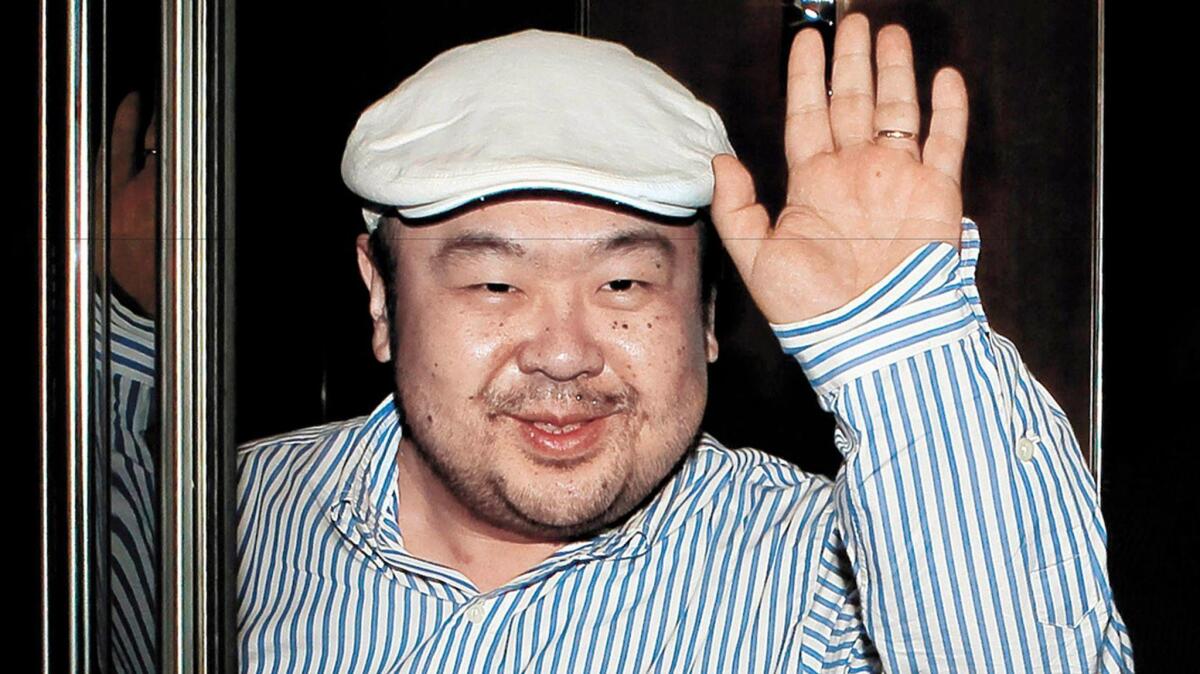North Korea bars Malaysians from leaving the country, and Malaysia strikes back
- Share via
Reporting from BEIJING — North Korea barred all Malaysian citizens in the country from leaving on Tuesday, and Malaysia responded in kind, deepening a diplomatic crisis that began when North Korean leader Kim Jong Un’s half brother, Kim Jong Nam, was killed in a Malaysian airport last month.
North Korea, angered by Malaysia’s investigation into the killing, announced that the exit ban would continue until the safety of North Korean diplomats and citizens in Malaysia is “fully guaranteed.” The two countries expelled each other’s ambassadors on Monday.
Malaysian Prime Minister Najib Razak called the ban an “abhorrent act,” adding that North Korea was “effectively holding our citizens hostage.” He responded by temporarily barring all North Koreans from leaving Malaysia.
Malaysian officials said 11 Malaysians are in North Korea — mostly diplomats and their family members — and 14 North Korean officials remain at the embassy in Kuala Lumpur. However, hundreds of North Koreans are believed to live and work in the country.
The tit-for-tat escalation is only part of a diplomatic nightmare engulfing Asia, with North Korea at its core. On Monday, Pyongyang test-launched four missiles — three of which landed within 200 miles of Japan’s coastline — and on Tuesday, North Korean state media reported that it hoped to eventually reach U.S. military bases in Japan.
On Tuesday morning, the U.S. announced that it had deployed an advanced missile defense system — a bulwark against Pyongyang’s missile threat — to South Korea months sooner than expected.
The deployment infuriated Beijing, which sees the system — Terminal High Altitude Area Defense, or THAAD — as part of a U.S. strategy to contain China, and has threatened to essentially sever diplomatic ties between Beijing and Seoul. China, North Korea’s only major ally and trading partner, has also been angered by its neighbor’s military ambitions, and relations between the two countries are at their worst in recent memory.
China will “take the necessary steps to safeguard our own security interests,” Foreign Ministry spokesman Geng Shuang said Tuesday. “The consequences will be shouldered by the United States and South Korea,” he added.
The U.S. and South Korea maintain THAAD — which can be operational as early as April — is a defensive system designed only to intercept and destroy short- and medium-range ballistic missiles. Therefore, they say, it poses no threat to Beijing.
“Continued provocative actions by North Korea, to include yesterday’s launch of multiple missiles, only confirm the prudence of our alliance decision last year to deploy THAAD to South Korea,” Adm. Harry Harris, who heads the U.S. Pacific Command, said in a statement.

The Malaysian standoff, meanwhile, began after police said two women approached Kim Jong Nam at the Kuala Lumpur airport on Feb. 13 and rubbed VX nerve agent, which is banned by the United Nations as a weapon of mass destruction, on his face. He died within 20 minutes. The two women — one from Indonesia and one from Vietnam — have been charged with murder, and told Malaysian investigators they thought they were participating in a prank.
Before the incident, Malaysia and North Korea had enjoyed relatively warm ties. Since 2009, Malaysia had been one of the only countries that allow entry to North Koreans visa-free, but Malaysian officials revoked the privilege soon after Kim’s death.
Malaysian police have implicated seven North Koreans in the case, including four who left the country on the day of Kim’s death.
Malaysia’s police chief, Khalid Abu Bakar, said Tuesday that he believed two of those suspects were hiding inside the North Korean Embassy in Kuala Lumpur. “We will wait and if it takes five years we will wait outside, definitely somebody will come out,” he told reporters, according to the BBC. The location of one remains unknown.
Malaysian authorities detained one North Korean man in connection with the case but released and deported him last week, citing “insufficient evidence to charge him.”
North Korea has repeatedly denied any responsibility for Kim’s death. A senior North Korean diplomat said last week that he probably died of a heart attack because he had a history of heart disease, diabetes and high blood pressure.
North Korea has rebuked Malaysia for performing an autopsy on Kim, and demanded that it return the body to Pyongyang.
Times staff writer W.J. Hennigan in Tokyo contributed to this report.
For more news from Asia, follow @JRKaiman on Twitter
ALSO
The day of Trump toilets and condoms in China may have just ended. Here’s why that’s controversial
Dennis Rodman talks North Korea diplomacy before an audience of cadets at West Point
Born under a bad sign: Mosul residents with Islamic State birth certificates need a do-over
More to Read
Sign up for Essential California
The most important California stories and recommendations in your inbox every morning.
You may occasionally receive promotional content from the Los Angeles Times.










